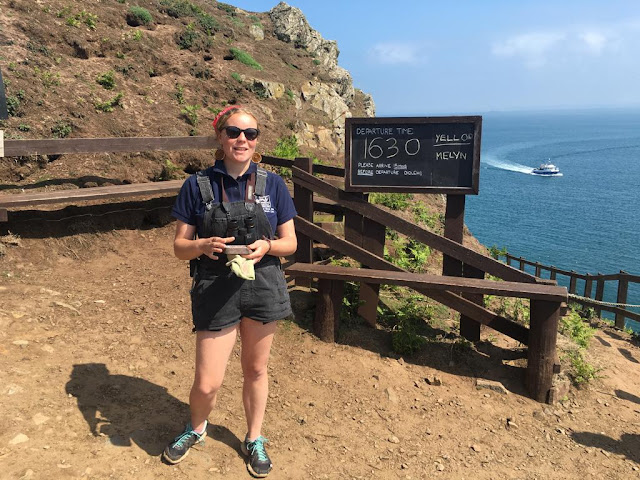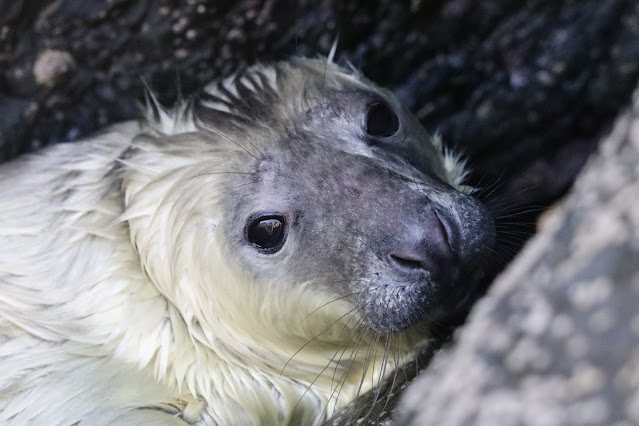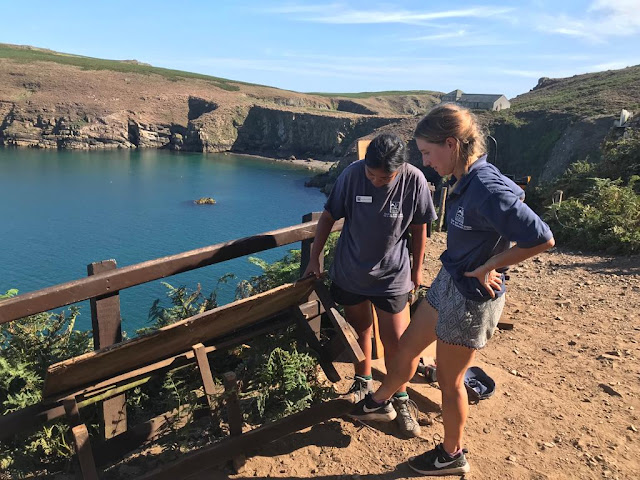Long-Term Volunteers
On 1st January, applications for long-term volunteering on Skomer for 2024 go live. Our long-term volunteers form an integral part of the island team. Assisting with day-to-day running of the island and supporting the wardens, visitor officer, and field worker with visitor engagement and wildlife monitoring. Simply put – we could not run without them!
 |
| Sunset at Garland Stone © Skomer VO |
We have three Long-Term Volunteer positions available in 2024:
- 2 positions Saturday 23rd March - Saturday 6th July
- 1 position Saturday 6th July - Tuesday 1st October
We also have one Seabird Monitoring Volunteer position available in 2024:
- 1 position Tuesday 21st May - Tuesday 25th June
What can I expect?
Public engagement
Skomer welcomes up to 250 visitors a day, and provides accommodation for 16 overnight guests. Staff and long-term volunteers work on a rota to deliver engaging welcome talks to visitors – sharing their favourite parts of the island, as well as any exciting updates (i.e. the first seal pup of the year hidden amongst boulders in South Haven, swallow chicks ready to fledge in the indoor picnic shelters, or a woodchat shrike calling at Moorey Mere!).
 |
| 2023 LTVs Maddie and El prepare to run morning boats - © WTSWW |
 |
| Long-term volunteer Eve (2022) runs afternoon boats © Skomer Assistant Warden |
Additionally, we host several overnight events over the course of the year. Long-term volunteers help to run these events. These include our family friendly Shearwater Week and Young Birders’ Week.
 |
| Long-term volunteers Lira and Anna (2022) identify moths with Bee and Ed, as part of Young Birders' Week © Skomer Assistant Warden |
Seasonal wildlife monitoring
Skomer is internationally important for seabirds, with over 42,000 Puffins, 30,000 Guillemots, 10,000 Razorbills and almost half the world’s population of Manx Shearwaters – a staggering 350,000 breeding pairs. The island is also home to an abundance of other wildlife, including breeding Chough, Curlew, and Peregrine, Atlantic Grey Seals and its own endemic sub-species of bank vole - Skomer Voles.
 |
| A pair of razorbills © Skomer VO |
 |
| Seal pup in Pigstone Bay © Skomer VO |
 |
| The team complete a Manx Shearwater census in 2023 - © WTSWW |
The team are responsible for monitoring, and counting these incredible species. The latter part of May into June is a particularly important time, with our seabird counts taking place during this period. Long-term volunteers are joined by a seabird monitoring volunteer to complete our annual census of cliff nesting seabirds and Manx shearwaters. Seal monitoring takes place from August onwards, with our first pup usually being seen in the first week on the month.
We also monitoring our breeding birds, carry out butterfly transects, and set moth traps.
 |
| Long-term volunteer Lira (2022) carries out a butterfly transect © Skomer Assistant Warden |
There is always wildlife monitoring going on, and long-term volunteers get stuck in with every aspect! Additionally, there are nearly always opportunities to get involved with the work our researchers are carrying out – ranging from Manx Shearwater chick weighing, to gull chick ringing.
 |
| Long-term volunteer Becca (2021) assists with Manxie chick weighing © Becca Wanless / LTV 2021 |
Maintenance Skills
Living away from the mainland means that when things break there isn’t always a ‘professional’ around to fix it…the quickest way is often to do it yourself! With the support of staff, long-term volunteers assist with maintenance tasks. In 2022 this included: fixing benches, building boardwalks, repairing burrows, painting, carpentry, widening paths, etc.
 |
| Long-term volunteers Lira and Anna (2022) prepare to fix a bench in North Haven © Skomer Assistant Warden |
Training (and PPE) is provided in the use of relevant tools and equipment. Long-term volunteers are also expected to assist in the cleaning and management of visitor accommodation and facilities when required.
Memories
We admit we are likely biased, but Skomer is a pretty cool place to spend 3-months. Alongside learning new skills and living on a National Nature Reserve, you’ll get to meet and work with people from all walks of life.
 |
| Some of the team of 2023 at a dungarees and folk music social - © Skomer VO |
How can I afford to volunteer?
We recognise that volunteering for an extended period of time can be tricky. Unfortunately, for many early career conservationists this balancing act can be too much. We’ve been working to make volunteering on Skomer more accessible, and offer the following benefits:- Free accommodation (including bills) for the duration
- Travel expenses to and from Skomer (from within the UK)
- Training budget - may include brushcutter, first aid course or Powerboat Level 2
- £350 bursary for LTVs and £250 bursary for Seabird Monitoring Volunteer is also available from the Friends of Skokholm and Skomer upon completion of a report which will be included in their newsletter.
Please note, all expenses must be claimed back through the Wildlife Trust of South and West Wales. We are unable to pay for travel or parking upfront.
Interested in applying? Apply here.
Please note that the deadline for LTV applications is 23:59 on Sunday 28th January 2024 and for Seabird Monitoring Volunteer applications the deadline is 23:59 on Tuesday 13th February. For any queries regarding long-term volunteering, please email skomer.volunteer@welshwildlife.org.
We look forward to receiving your application. Pob lwc!
Rob, Skomer VO.
No comments:
Post a Comment